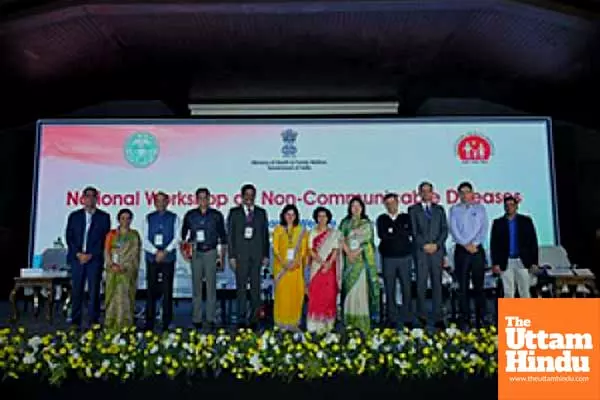
Health Ministry calls for inter-sectoral collaboration, enhanced research to address NCDs

New Delhi (The Uttam Hindu): Inter-sectoral collaboration and enhanced research are crucial to address the rising burden of Non-Communicable Diseases (NCDs) like diabetes, hypertension, and obesity, said the Union Health Ministry on Friday. NCDs account for over 66 per cent of all deaths across the nation. The burden of NCDs such as cardiovascular diseases, diabetes, chronic respiratory diseases, and cancers has also become a significant public health challenge, particularly among individuals over the age of 30. “The need for inter-sectoral collaboration, enhanced research, and innovative practices to address the growing burden of NCDs,” said Punya Salila Srivastava, Union Health Secretary.
She said this at the two-day national workshop on NCDs, hosted by the Union Health Ministry in collaboration with the Government of Telangana from January 8-9. The workshop brought together key stakeholders including Principal Secretaries (Health), Mission Director-National Health Mission, and other senior officers from all the States and Union Territories, health professionals, and policymakers from across the country, focused on strengthening strategies for the prevention, screening, management, and treatment of NCDs.
“This national workshop marked a significant step toward achieving the government’s vision of a ‘Healthy India’, with an emphasis on universal access to quality healthcare services and the reduction of premature mortality from NCDs,” Srivastava said. She noted that the workshop will enable the Health Ministry “to strategise the priorities while submitting proposals before the 16th Finance Commission of India for strengthening the health care system including prevention and control of NCDs”. The conference featured comprehensive discussions, field visits, and knowledge-sharing sessions addressing different aspects of major NCDs, including diabetes, hypertension, chronic kidney disease (CKD), chronic respiratory disease (CRD), non-alcoholic fatty liver disease (NAFLD), stroke, and cancer. Community-based interventions were a major focus, with sessions emphasising the role of campaigns such as Fit India and Eat Right India. It also discussed state-specific strategies to address hypertension and cancer, as well as explored strategies to address gaps in cancer care -- from screening to follow-up.

